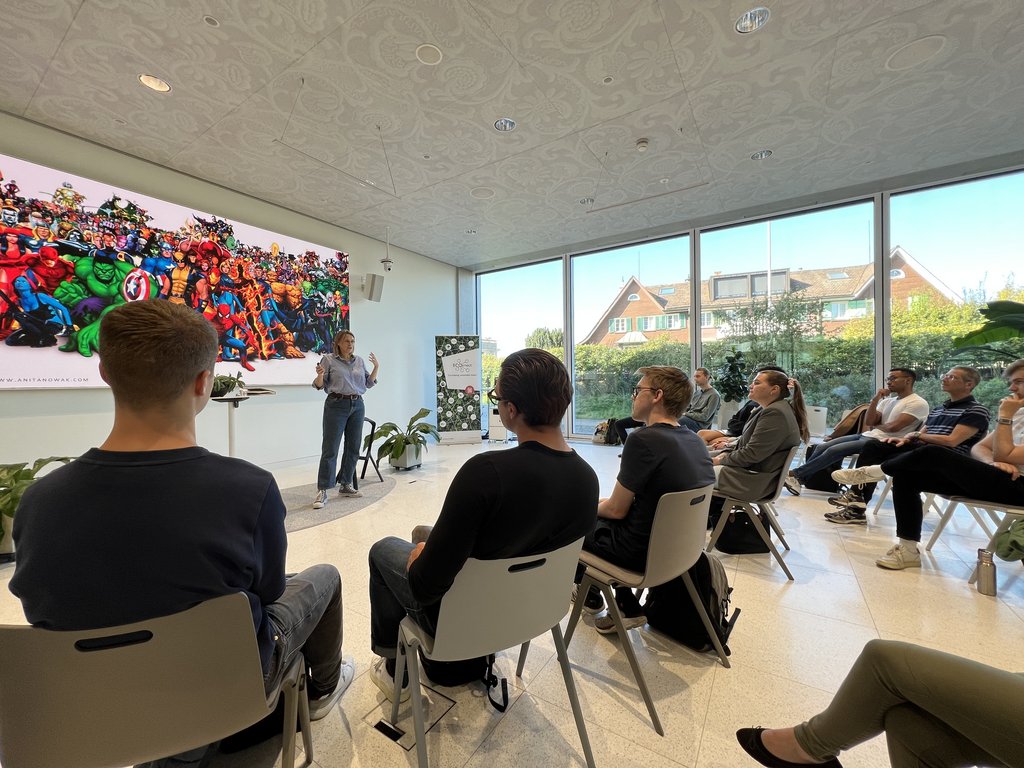Background - 16.10.2023 - 09:00
The power of empathy: why good leaders rely on it
Empathic people have an easier time building and maintaining interpersonal relationships. This is true in a variety of social contexts, both private and professional. But do we know how empathy can be learned and practised to address the great challenges of our time? Anita Nowak from McGill University, an expert on empathy and applied neuroscience, examined this question at SQUARE on 13 October.

But do we know how empathy can be learned and practised to address the great challenges of our time? Anita Nowak from McGill University examined this question at SQUARE.
People are characterized by empathy. At the same time, this ability is being severely tested against the backdrop of climate change, rapid technological progress, increasing fake news and the polarization of society. Fostering our ability to empathize has various positive effects: on health, happiness and performance. For example, companies committed to sustainability, diversity and inclusion increasingly expect empathic behaviour from their leaders.
Anita Nowak, Ph.D., is an empathy expert, award-winning educator, speaker, podcaster and author of “Purposeful Empathy: Tapping Our Hidden Superpower for Personal, Organizational, and Social Change”. As a certified coach, she supports family foundations in translating their philanthropic goals into social change. Anita Nowak is also a faculty member of the McGill Executive Institute in Montreal, Canada, where she is dedicated to educating and mentoring students, the “next generation of change-makers”. She teaches Leadership, Ethics in Management and Social Entrepreneurship & Innovation.
The Empathy Imperative in an Era of Radical Transformation
In a keynote, Anita Nowak shed light on the role of empathy in disruptive environments. For years, she has been researching the connection between what she calls “purposeful empathy” and humanity’s collective future. Purposeful empathy describes the deliberate and conscious practice of emphatically putting oneself in others’ shoes in order to achieve a specific goal or intention. It is not only about actively understanding and sharing the other person’s feelings, thoughts and perspectives, but also about promoting positive and meaningful outcomes.
Anita Nowak introduced the participants to six steps to empathic leadership using a model from her recent book and guided them through simple exercises that can be applied in everyday life. Empathy is something that can be actively practised in life. For example, the exercises included the “box breathing” technique, which helps with self-regulating one’s emotions, and an “eye gazing” exercise to increase connection with other people. The techniques can contribute to purposeful empathy by allowing conscious access to one’s own feelings as well as those of others.
Empathy is rooted in human nature and is key to creating more inclusive and sustainable organizations, said Anita Nowak. Empathy helps us to improve relationships with team members, customers and other contacts, to resolve conflicts, to promote cooperation and ultimately to increase general well-being in organizations. Not least for this reason, empathic behaviour is increasingly considered as a characteristic of good leaders.
Fostering empathy at universities
In the afternoon, Anita Novak led an interactive seminar outside, on the lawn in front of the main building. In a relaxed atmosphere, she shared her insights and experiences from the Inner Development Goals Summit in Stockholm, an annual gathering of researchers, experts and practitioners from the fields of leadership development and sustainability. The summit took place just a few days before her visit to St.Gallen. It brought together a global community that focused on how the power of inner development can be harnessed to solve the worldwide challenges facing humanity.
Anita Nowak then presented the students with practical approaches from her current research that aims to link two aspects: on the one hand, measures that help to achieve specific UN Sustainable Development Goals (SDGs), and on the other hand, measures for the inner development of employees in organizations. Purposeful empathy played a central role in these approaches, because simply reflecting on the potential for inner development requires an empathic reflection partner, said Anita Nowak.
In conclusion, Anita Nowak encouraged the participants to practise empathic leadership themselves and thereby contribute to positive change. True to the words of US anthropologist Margaret Mead: “Never doubt that a small group of thoughtful, committed citizens can change the world; indeed, it's the only thing that ever has.” As neuroscience confirms, we were born to feel empathy because it is good for us, the empathy expert said.
The two events were organised by the HSG Delegate’s Team for Responsibility & Sustainability, the HSG Impact Scholar Community, the HSG Mentoring Programme, ECOnnect and the Agenda 2030 Network St.Gallen.
Image: HSG Delegate’s Team for Responsibility & Sustainability
More articles from the same category
Discover our special topics



![[Translate to English:] Choix Goncourt de la Suisse | unisg.ch](https://www.unisg.ch/fileadmin/_processed_/b/a/csm_Choix_Concourt_de_la_Suisse_HT-Stibi-069_2110740678.jpg)







